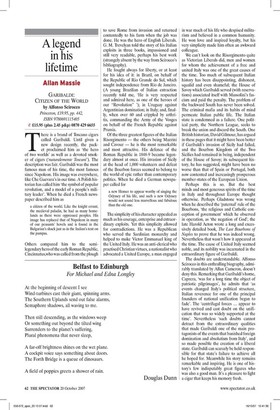A legend in his lifetime
Allan Massie GARIBALDI: CITIZEN OF THE WORLD by Alfonso Scirocco Princeton, £19.95, pp. 442, ISBN 9780691115405 £15.95 (plus 2.45 p&p) 0870 429 6655 There is a brand of Toscano cigars called Garibaldi. Until given a new design recently, the packet proclaimed him as `the hero of two worlds' as well as a devoted smoker of cigars (naturalemente Toscani'). The description was fair. Garibaldi was the most famous man of his time, the most famous since Napoleon. His image was everywhere, like Che Guevara's in our time. A Polish historian has called him 'the symbol of popular revolution, and a model of a people's military leader'. When he died a French newspaper described him as a citizen of the world. Like the knight errant, the medieval paladin, he had as many homelands as there were oppressed peoples. His image has replaced that of Napoleon in many of our peasants' hovels and is found in the Bulgarian's shack just as in the Indian's tent on the pampas.
Others compared him to the semilegendary hero of the early Roman Republic, Cincinnatus,who was called from the plough to save Rome from invasion and returned contentedly to his farm when the job was done. He was the hero of English Liberals. G. M. Trevelyan told the story of his Italian exploits in three books, impassioned and still very readable, perhaps his best work (strangely absent by the way from Scirocco's bibliography).
He fought always for liberty, or at least for his idea of it: in Brazil, on behalf of the Republic of Rio Grande do Sul, which sought independence from Rio de Janeiro. (A young Brazilian of Italian extraction recently told me, 'He is very respected and admired here, as one of the heroes of our "Revolution" '); in Uruguay against Argentinian domination; in Italy; and, finally, when over 60 and crippled by arthritis, commanding the Army of the Vosges on behalf of the French Republic against Prussia.
Of the three greatest figures of the Italian Risorgimento — the others being Mazzini and Cavour — he is the most remarkable and most attractive. His defence of the Roman Republic in 1848-9 became legendary almost at once. His invasion of Sicily at the head of 1,000 volunteers and defeat of the Bourbon forces seemed to belong to the world of epic rather than contemporary politics. When he died a German newspaper called for a new Homer to appear worthy of singing the Odyssey of his life, and such a new Odyssey would not sound less marvellous and fabulous than the old one.
The simplicity of his character appealed as much as his courage, enterprise and extraordinary exploits. Yet this simplicity allowed for contradictions. He was a Republican who served the Sardinian monarchy and helped to make Victor Emmanuel king of the United Italy. He was an anti-clerical who practised Christian virtues, a nationalist who advocated a United Europe, a man engaged in war much of his life who despised militarism and believed in a common humanity. He won love and inspired loyalty, but his very simplicity made him often an awkward colleague.
We can't look on the Risorgimento quite as Victorian Liberals did, men and women for whom the achievement of a free and united Italy was one of the great causes of the time. Too much of subsequent Italian history has been disappointing, dishonest, squalid and even shameful; the House of Savoy which Garibaldi served (with reservations) associated itself with Mussolini's fascism and paid the penalty. The problem of the backward South has never been solved. The criminal mafia and its habits of mind permeate Italian public life. The Italian state is condemned as a failure. One political party, the Northern League, seeks to break the union and discard the South. One British historian, David Gilmour, has argued in these pages that it might have been better if Garibaldi's invasion of Sicily had failed, and the Bourbon Kingdom of the Two Sicilies had remained in being, independent of the House of Savoy; its subsequent history, he has suggested, might have been no worse than that of Spain or Portugal, both now contented and increasingly prosperous member-states of the European Union.
Perhaps this is so. But the best minds and most generous spirits of the time in Italy and throughout Europe thought otherwise. Perhaps Gladstone was wrong when he described the 'paternal' rule of the Bourbons, `the religious and Catholic conception of government' which he observed in operation, as `the negation of God'; the late Harold Acton wrote a long and excessively detailed book, The Last Bourbons of Naples to prove that he was indeed wrong. Nevertheless that wasn't how it appeared at the time. The cause of United Italy seemed noble, and its nobility was incarnated in the extraordinary figure of Garibaldi.
The doubts are understandable. Alfonso Scirocco in this enthralling biography, admirably translated by Allan Cameron, doesn't deny this. Remarking that Garibaldi's home, Caprera, 'was for a long time the object of patriotic pilgrimages', he admits that 'as events changed Italy's political structure, Italian reverence for one of the principal founders of national unification began to fade'. The 'centrifugal forces ... appear to have revived and cast doubt on the unification that was so widely supported at the time'. Nevertheless 'such doubts cannot detract from the extraordinary qualities that made Garibaldi one of the main protagonists of the events that banished foreign domination and absolutism from Italy', and so made possible the creation of a liberal state. Garibaldi can scarcely be held responsible for that state's failure to achieve all he hoped for. Meanwhile his story remains remarkable and inspiring. He is one of history's few indisputably great figures who was also a good man. It's a pleasure to light a cigar that keeps his memory fresh.







































































 Previous page
Previous page